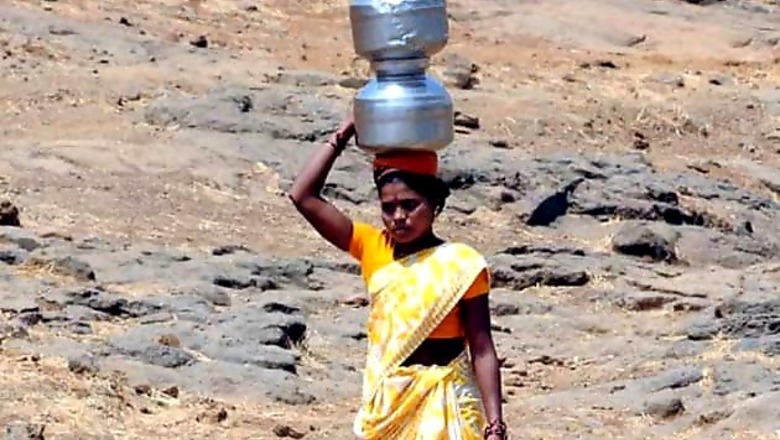
views
Mumbai: Water, the elixir of life, needs to be preserved and conserved. That’s an indisputable fact. But government authorities appear to be carrying out this conservation keeping thousands perennially parched. So, while a person living in Mumbai gets about 45 litres of water a day, a study in stark contrast is the fate of Nashera in Mokhada taluka, Thane.
This little village of 1,300 inhabitants got its first lot of 4,000 litres of water by a tanker on Wednesday, after a wait of over a month. That translates into about 3 litres for each villager, in 30 days. Interestingly, the Vaitarna lake, one of the main sources of water supply to Mumbai, is merely a few kilometres from this village. But authorities have done nothing to cover the dry spell of the denizens.
According to a recent survey done by BMC’s rainwater harvesting cell, the corporation supplies 3,300 million litres of water every day, of which 20 per cent (660 MLD) go to waste owing to leakage and pilferage, apart from household wastage. While in a few hundred kilometres of Thane’s rural areas, over 38 tribal villages are struggling to get even two litres of water per head per day.
Who'll plug the leak?
Manglu Hadunga (31), sarpanch of Nashera village, told MiD DAY they have been facing water problems for decades. Every summer their ponds, wells and even lakes dry up and they have to face severe water scarcity.
Though farming is the basic occupation here, most of the villagers are unemployed and have no source of livelihood after the monsoons. Whatever they cultivate (rice, urad and toor dals etc) is used for self-consumption rather than selling in open markets.
Glass utterly empty
Manglu added, “A month ago, we informed local authorities including the block development officer (BDO) about the drought condition in our village and requested them to send water tankers daily. They merely said that a tanker would be sent once a tender is floated and finalised.”
“We are forced to drink unhealthy muddy water from the drain; we have no other source of potable water. The rainwater stored in wells and ponds gets dried up by November end. Though we manage to cope with the scarcity in winter, the situation becomes unbearable during summer, when we have to struggle for every single droplet,” said Vanita Salve, a local resident.
According to Manglu, hundreds of villagers stormed the well on the outskirts of the village since 9 am on Wednesday after they were informed that the water tanker was expected by afternoon. Armed with cans and vessels, even schoolchildren were seen queuing up.
At around 1 pm, the tanker with approximately 4,000 litres arrived and emptied the water into the well. The villagers did not waste even a second, and started collecting the muddy water from the well by any means possible. “I wanted to take water for my family and was waiting here for over three hours. I finally managed to get just a small bowlful,” said Valu, a young boy from the village.
Circumstances are no different in other neighbouring villages of Mokhada, Vikramgad and Jawhar talukas. Santosh Gawli, grampanchayat member of Dolara village said, “Since the death of Parvati Jadhav, the local administration has started sending water tankers twice a day (approximately 10,000 litres) as compared to 4,000 litres earlier. These are temporary measures and a permanent solution is the need of the hour. The local borewell lies broken for the last eight years and the local body has not even bothered to spend a few thousand rupees to fix it. We are told that crores of rupees are being spent for tribal welfare, but at ground level no welfare can be seen. We are deprived of even basic living needs.”
Parvati Ramu Jadhav (41), a mother of five, had left her house as usual to fetch water. Dolara village is facing scarcity of water since March 2012. As usual, a tanker loaded with 4,000 litres came to the village, after four days, around 9.30 am. Parvati was waiting for it like hundreds of other villagers since early morning. There was a lot of commotion at the well and people were pushing each other. Around 10.30 am, she managed to get two pots of water, and brought it to her house. A few minutes later, she left to get more, but by then the tanker had gone. Parvati, who had been walking under the scorching sun for hours, suddenly felt uneasy and collapsed.
Life’s cheap here
According to Pundalik, a relative, who was with her, “I carried her home. She was unconscious, so I took her to a local doctor, who said her condition was serious and shifted her to a private hospital in Nashik. She was admitted in the ICU for a day and on April 21, she was declared dead. We sold our cattle and borrowed money from our relatives to pay the hospital fee of Rs 45,000.”
The local administration’s project office provided 1 quintal of rice and Rs 15,000 to the family.
On Wednesday afternoon, residents of Dolara village, including women, expressed their grievances about the water situation to Rajendra Gavit, state tribal development minister. The minister met the five children of Parvati Jadhav and offered them a cheque of Rs 1 lakh on behalf of the state government and Rs 50,000 in cash as a personal gesture. Gavit also assured villagers that everything possible would be done to resolve the situation. However, locals were keen that he makes good his promises. The minister assured them of sorting out the issue by June.
Speaking to MiD DAY, Gavit said, “I have asked the water department and local bodies to submit a detailed feasibility report to me within two days. The first priority will be to check if the long-pending demand of the villagers to get water from Khoch dam is practicable or not. Secondly, emphasis is also on constructing water tanks for rainwater harvesting in drought-affected villages in Jawhar, Mokhada and Vikramgad talukas. It is unfortunate that a tribal woman had to lose her life for water. I have met the grieving family and have provided financial aid.”
Dry run
Social activist Ravindra Shivade from Jawhar village displayed little faith. “These are blank promises; the corruption nexus between local authorities and contractors should be first stopped. In the name of tribal development, crores of rupees are being pocketed and no one is held accountable for the clandestine behaviour. These villagers have been crying themselves hoarse for water for decades, but no one has heard their wails so far.”
Vasai MLA and chief of Shramajivi Sanghatana, Vivek Pandit, wrote a letter to Chief Minister Prithviraj Chavhan on April 23, highlighting the circumstances in which Parvati lost her life. Also, he drew the CM’s attention to the fact that the tender rates for water tankers – Rs 1,400 per day – has not been revised since 2009 and that the same be increased by 30 per cent.
Tanker operators were finding it difficult to render their services at such a low price, as fuel costs and other overhead expenses have gone up, he said. Pandit also suggested that the power for planning and execution of water supply to tribal areas, which is presently with the collector, be given to the additional collector, Jawhar.
Officials speak
KS Lokhande, deputy engineer (water supply), Mokhada taluka: “We have already got Rs 38 lakh sanctioned for construction of a water tank and laying pipelines at Nashera village. Since the village is on a hill, we are hopeful the water crisis would be sorted out soon. Work would commence by the second week of May. Water tankers have been sanctioned for other villages, which are facing water scarcity.”
SM Kurtkoti, sub-divisional officer, Jawhar: “Out of 59 villages and 220 padas in the four talukas (Jawhar, Mokhada, Vikramgad and Wada), 38 villages are still facing water scarcity. We have a proposal and have sanction to construct overhead water tanks for rainwater harvesting from this year in such villages, once the monsoon is over. The tanks will be locked and the water will be used only during the summers. Also, the priority is on a feasibility study of getting water to the tribal villages from Khoch dam.”
30,000 litres wasted in Mulund
In less than 24 hours, over 30,000 litres of water were wasted in Mulund (E), between Tuesday afternoon and Wednesday. According to BMC’s hydraulic department staffers, who were at the spot, they had opened the air valve from the main water pipelines, which pass water up to Malabar Hill, as a routine practice. “The air valve has to be opened to avoid any pipe burst after carrying out repair work,” explained a technician.
However, when asked if the water could have been stored in water tanks, instead of wasting it, a representative admitted that the same is possible, but it is time consuming and since they have to finish the repair work within a stipulated time frame, the idea of getting the water stored in tanks is not feasible.
Did you know?
- Mumbai has a population of 1.25 crore.
- Every household throws away at least two buckets (40 l) of ‘stale’ water every day.
- Every person who brushes his teeth for five minutes before an open tap wastes 60 litres of water.
- About 106 litres go down the drain when a person shaves in front of an open tap.
- There are as many as 20 lakh automobiles in the city. Whenever a person washes his vehicle with water from a hose, he consumes about 120 litres.

















Comments
0 comment